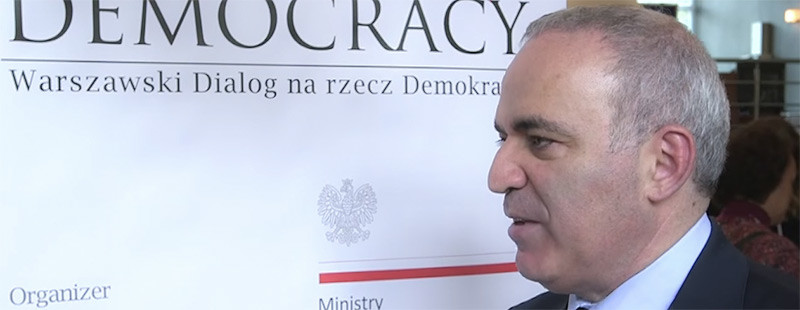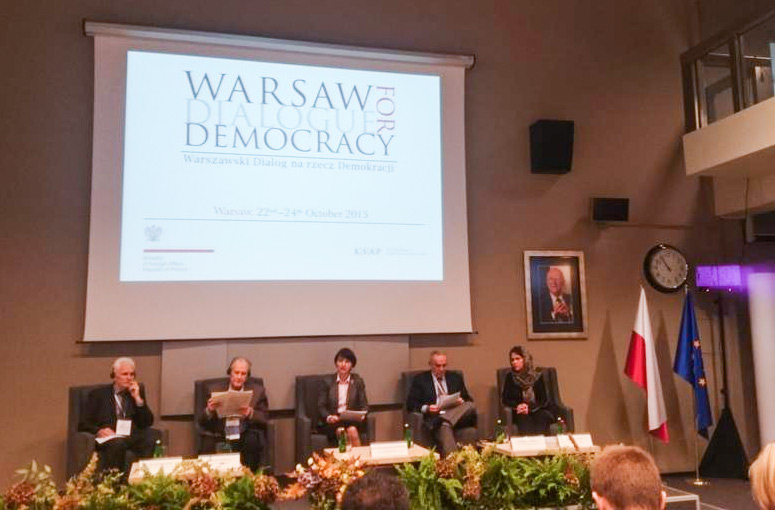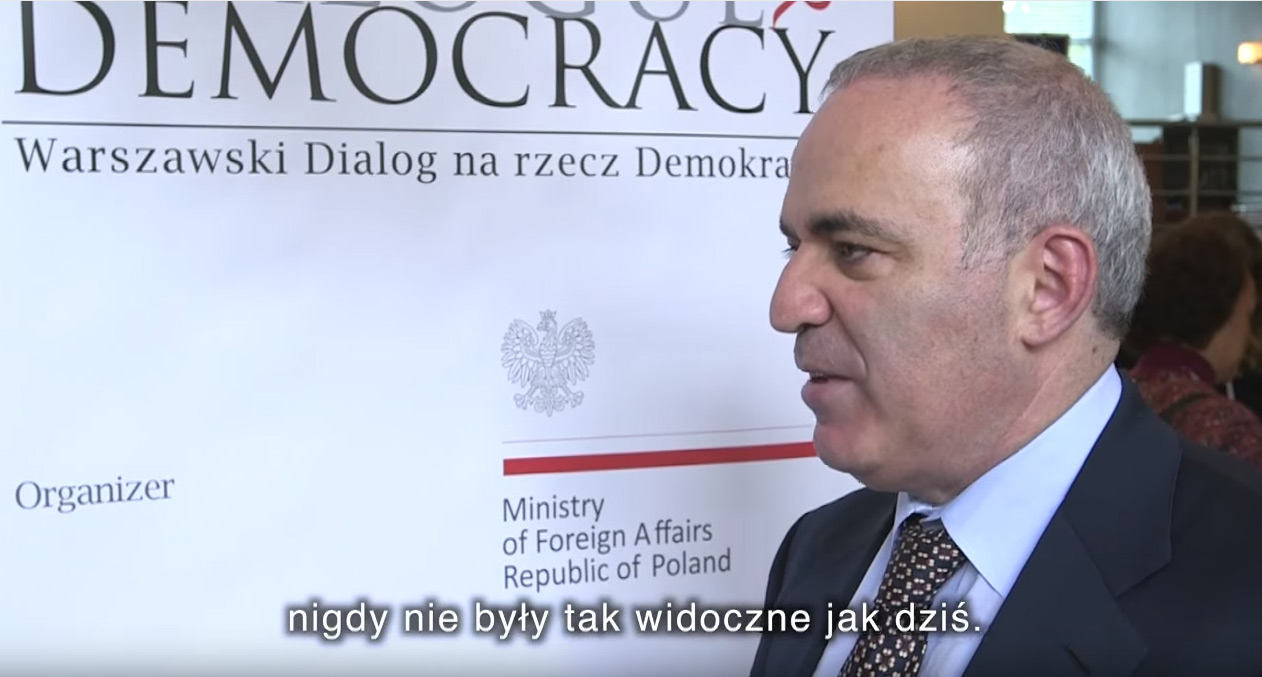

[ The full text of Garry’s speech at the 2015 Dialogue for Democracy in Warsaw, Poland, on Oct 23, 2015 ]
Poland Knows
Thank you for having me here today. The theme of this conference is democracy, and, to appreciate democracy, and why it is important to defend it, it is essential to understand the alternatives. This is why Poland has such a vital role in the discussion today. Much of the rest of Europe has enjoyed democracy and free society for several generations and they have been very eager to treat over 40 years of Cold War as an unfortunate chapter that is best forgotten, or treated like ancient history with little to teach us today. Similarly, the horrors of World War II and the years of appeasement that led up to it are treated like mythology that could not have been prevented and that could never be repeated.
Poland understands terribly well that those events were real—and that real people made real decisions that led to those horrific events. That is the first and most important thing we must remember and repeat: that nothing is inevitable. We cannot abdicate our responsibility for our history. We must not abdicate our responsibility for our future. We make choices that create our past, present, and future, and we must take responsibility for those choices.
Poland understands, but how to convince the rest? How to convince the safe and wealthy nations of the free world that they are not as safe as they think and that their wealth depends on a global stability that is under direct attack? If the invasion and annexation of European territory for the first time since World War II in Ukraine isn’t enough to rouse the free world from its post-Cold War complacency, is there anything that can be done? How can we defend the virtual borders of democracy and human rights and moral values when we will not defend our geographical borders against aggression?
These are the critical questions that the hostile dictatorship of Vladimir Putin is forcing Europe to wrestle with today. Ten years ago, I said that Putin was a Russian problem for Russians to deal with, but that if the free world did not stand up to him he would soon be everyone’s problem. Unfortunately, this is what has come to pass. Instead of cutting Putin off as he crushed democracy in Russia, Europe, the US, and the G-7 treated Putin as an equal. This also made it nearly impossible for our opposition movement to challenge Putin as anti-democratic in Russia. How could that be true when he was posing with warm smiles with the leaders of the free world?
Putin, like other modern autocrats, has an advantage that the Soviet leadership could never have dreamed of: deep economic and political engagement with the free world. The naïve idea was that the free world would use economic and social ties to gradually liberalize authoritarian states. In practice, the authoritarian states have abused this access and economic interdependency to spread their corruption while cracking down ever harder at home. Instead of isolating Putin to create an incentive for Russian elites to abandon him, Western leaders allowed Putin to show the elites that he could provide for them and protect them no matter how much they stole, and no matter what he did to our neighbors.
If you don’t remember what punishment was given to Russia for invading tiny Georgia in 2008 it’s because there wasn’t any punishment. Not only was Russia not sanctioned over Georgia, a few months later Putin was rewarded by newly sworn-in President Barack Obama and his Secretary of State, Hillary Clinton. Their infamous “Russian Reset” wiped the slate clean despite no concessions or change in behavior from the Kremlin. This cemented Putin’s position in Russia as the capo de tutti capi, the boss of all bosses. Loyalty to Putin became the only measure of success and failure in Russian politics, bureaucracy, and business.
Dictatorships, especially the one-man variety like Russia’s, are unpredictable, but they do operate on logical underlying principles. They often come to power with popular support and a mandate to solve a crisis. Once a firm grip on power is achieved, the junta or supreme leader blames his predecessors and cracks down on rights. With democracy dead and civil society hunted to extinction the only way left for a dictator to make a legitimate claim on power is confrontation and conflict. Propaganda is increased against mythical fifth columnists and the usual scapegoats like immigrants and minorities.
The next and usually final phase arrives when all the other tricks are used up. Domestic enemies are never quite threatening enough—and eventually there is no one left to persecute except each other, as in the U.S.S.R under Josef Stalin—so the dictator looks abroad, inevitably finding a “national interest” to defend across a convenient border. This external conflict phase is especially dangerous because there are very few examples of nations moving away from it peacefully. War and revolution are the more frequent ways it burns itself out. The Soviet Union altered its course slightly after Stalin’s death, but it was a unique and gigantic superpower with enough resources for its leadership to believe they could compete with the free world instead of declaring war on it. As it turned out they were very wrong, something other autocrats, including Putin, understand very well today.
They watched and learned that their people will eventually begin to compare living standards and to see the truth if left unmolested by war and strife for too long. This window on the world is much larger in the internet age, and so the conflicts and propaganda have to be even more extreme. Putin moved fully into confrontation mode with the invasion of Ukraine and he cannot afford to back down. Iran is another example of a dictatorship that must justify its power with a never-ending supply of enemies to fight. These regimes need conflict to survive and negotiating with them without acknowledging that fact is dangerously ignorant.
Another way of examining Putin’s plans is to look at his budget. The Russian economy is staggering due to the big drop in the price of oil and, to a lesser extent, Western sanctions. One way Putin centralized his power in Russia was to turn the country into a petro-state. You don’t need an intelligentsia, or even an educated workforce or citizenry, to pump oil and gas out of the ground. But when the price of energy drops, the lack of education and diversity in the Russian economy after 16 years of Putinism is exposed. Like so many other dictatorship policies, encouraging brain-drain is good power politics in the short run but a catastrophe for the country.
Putin’s response to recession was very clear: more money for the military, for internal security and police, and a big boost to domestic and international propaganda. Meanwhile, pensions are dropping in real terms for the first time. Putin’s devil’s bargain to provide security in exchange for liberty was only possible due to the skyrocketing price of oil. Now that is over and his priorities are obvious. Less food, less energy for Russians. More repression, more weapons, more foreign adventures, more enemies, more propaganda. With his latest mission in Syria, Putin is telling the world that this is the new normal. Russia will be an aggressor on the international stage for as long as Putin is power. The only question is how the world will respond.
An appropriate reaction to Putin’s aggression in Ukraine and his brutality in Russia will require a battle with many fronts. Sanctions are good, but they are not enough. To the most immediate crisis, Ukraine must be comprehensively supported militarily and economically. Defensive weapons that will raise the political costs for Putin in Russia are essential. It isn’t necessary to defeat the entire Russian army or to start World War III, to address two of the most popular straw man arguments. Putin can never afford to look like a loser, which is why he maintains the feeble illusion Russian forces aren’t fighting in Ukraine. Inflicting enough damage to pierce that illusion is enough. Putin is already blaming the US and NATO for everything in Ukraine anyway so there can be no escalation in that regard.
Ukraine is next to Poland and may seem far away to Western Europe and North America. Ukraine is being sacrificed as a buffer state in a way Poland must see as terribly familiar. But it is also the front line of a war the United States, the United Kingdom, and the rest of the free world is fighting whether it admits it or not. Engagement has failed and it is past time for stronger stuff. Putin’s oligarch supporters must be forced to choose between defying him and loss of their access to the free world and the billions in assets they hold there. The Russian oligarchs are supporting a sponsor of terror in Ukraine, and now Syria, and there is no shortage of existing laws to prosecute such activity. It may already be too late for such soft pressure to work, but we must begin to push back.
One things we know about aggressive dictators is that they don’t stop until they are stopped. Putin will continue to attack in Ukraine until he risks defeat. He looks for opportunities to destabilize NATO and the EU where the alliances will not defend. He helps Bashar Assad send millions of refugees to Europe. He supports extremist parties in Europe and funds Western NGOs to promote the Kremlin agenda. He uses a huge media empire, top lobbying firms, and the free world’s own open justice, commerce, and media infrastructures to attack critics and persecute opponents. He looks for weaknesses in Baltic waters and Turkish airspace. This is not warmongering; this is already a war.
Every Putin action that catches the West flat-footed leads to another round of what a brilliant “chess master” he is, a metaphor that annoys me more than most, as you might imagine. For years I’ve said that Putin doesn’t play geopolitical chess, and if he did he wouldn’t be very good at it. He is, however, good at playing poker with a weak hand against anxious opponents who fold against his every bluff.
Putin will continue as long as he is unopposed. Dictators do not ask “why?” when it comes to grabbing more territory or power. They only ask “why not?” The appeasers said that Putin was a Russian problem. Now they say that Ukraine is a European problem and that Syria is a Middle Eastern problem. Next maybe they will be saying that Russia in Libya and Venezuela are African and South American problems! It would be far less dangerous to act before that happens.
Putin is trapped in a downward spiral of hatred and violence. His survival at home depends on it. It will end only with a defeat in a conflict abroad and when Russians are willing to shed their blood to free themselves. When the end comes for Putin it will be the way that most dictators fall: abruptly, violently, and as a result of the economic and moral bankruptcy of the state he has created in his image.
The greatest danger isn’t in confronting Putin, it is in waiting so long to do so that the stakes will be incredibly high. Confrontation and strength are not what leads to war with a dictator, quite the opposite. Allowing him to become so bold and so overextended that he eventually takes too big a risk is the greatest threat of war. The longer we wait, the more confident he becomes and the more dangerous the eventual confrontation will be. Yes, stopping Putin now will be harder now than it would have been two years ago, but it will be easier than it will be a month from now or a year from now. Putin will continue until the day he is gone from power. So let us do everything possible to speed the arrival of that day.
Promo video from the organizers, including an interview clip with Garry in English.



